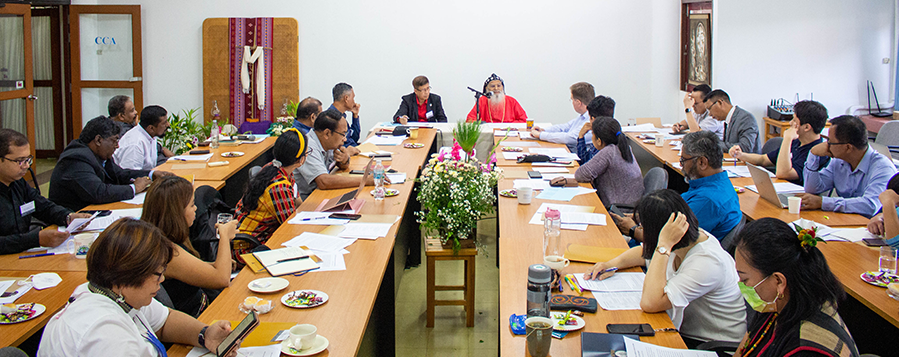Ecumenical Diakonia is aimed at mitigating the sufferings of all who experience deprivation, says Metropolitan Dr Yakob Mar Irenaios at CCA Consultation
 Metropolitan Dr Yakob Mar Irenaois speaks on 'Biblical and theological reflection on Diakonia as the mission and witness of the Church'
Metropolitan Dr Yakob Mar Irenaois speaks on 'Biblical and theological reflection on Diakonia as the mission and witness of the Church'
Chiang Mai: “Ecumenical Diakonia embraces the entire creation and seeks its well-being; it is aimed at mitigating the sufferings and privations of all who experience deprivation and exploitation of one kind or the other,” Metropolitan Dr Mar Yakob Irenaios of the Malankara Orthodox Syrian Church in India told the participants of the Asia Regional Consultation on ‘Ecumenical Diakonia, Church’s response to Sustainable Development Goals in Asia’, organised by the Christian Conference of Asia (CCA) in collaboration with the World Council of Churches.
In a presentation on ‘Biblical and theological reflection on Diakonia as the mission and witness of the Church,’ Metropolitan Irenaois, who is the President of the Christian Agency for Social Action (CASA), India’s largest diaconal mission agency established by Indian churches in 1947, affirmed, “Real witnessing is not through speeches or sermons, but through life and life-enhancing activities. To say that ecumenical Diakonia is the Church’s mission and witness means that the Church is to carry on what the Messiah has been and is still doing in this world; this is the true mission. Mission and witness are inextricably linked. The mission revolves around witnessing.”
Metropolitan Irenaois pointed out, “The idea of ‘Diakonia’, or service, is not something new to the Church. The qualifying word, ‘ecumenical’, has added a new dimension to it. The Diakonia, the assigned duty with the Church, is for the whole world. Since Christian churches always uphold the value of human life and dignity, they shall come together, ‘living’ the spirit of the Holy Writ, to address the larger and subtler issues.”
Dr Ronald Lalthanmawia, programme coordinator of CCA, in a presentation titled ‘Achieving Sustainable Development Goals: Measuring Change’, described the challenges that Asia faces with the SDGs, including geographical expansion, social and cultural variation, rising inequality in Asian countries, widening disparities between rich and poor, and low wages that have negative social and environmental consequences.
“The inequity of progress toward the SDGs is evidenced in the lives of vulnerable population groups throughout Asia and the Pacific who are most at risk of being left behind. Slow progress, stagnation, and regression in meeting the SDG targets continue to place the greatest burden on the most vulnerable,” Dr Lalthanmawia explained.
“There is an urgent need for regional collaboration and partnerships to ensure that no one and no country in any of the Asia-Pacific subregions is left behind as SDG progress stagnates or regresses,” he added.
The Asia Regional Consultation, being held on 24–26 October 2022 with a focus on ‘Ecumenical Diakonia, Church’s response to Sustainable Development Goals in Asia’, brings together 35 representatives of member churches and ecumenical organisations from across Asia who have been involved in Diaconal service in various communities and societies.










